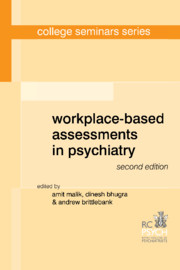Book contents
- Frontmatter
- Contents
- List of tables, boxes and figures
- List of contributors
- Preface
- 1 Introduction: changes in training
- 2 Workplace-based assessment methods: literature overview
- 3 Case-based discussion
- 4 The mini-Assessed Clinical Encounter (mini-ACE)
- 5 The Assessment of Clinical Expertise (ACE)
- 6 Multi-source feedback
- 7 Direct Observation of Non-Clinical Skills: a new tool to assess higher psychiatric trainees
- 8 Workplace-based assessments in psychotherapy
- 9 Educational supervisor's report
- 10 Portfolios
- 11 Annual Review of Competence Progression (ARCP)
- 12 Examinations in the era of competency training
- 13 Piloting workplace-based assessments in psychiatry
- 14 Developing and delivering an online assessment system: Assessments Online
- 15 A trainee perspective of workplace-based assessments
- 16 Conclusions
- Appendix 1 Assessment forms
- Appendix 2 Guide for ARCP panels in core psychiatry training
- Appendix 3 The MRCPsych examination
- Index
9 - Educational supervisor's report
Published online by Cambridge University Press: 01 January 2018
- Frontmatter
- Contents
- List of tables, boxes and figures
- List of contributors
- Preface
- 1 Introduction: changes in training
- 2 Workplace-based assessment methods: literature overview
- 3 Case-based discussion
- 4 The mini-Assessed Clinical Encounter (mini-ACE)
- 5 The Assessment of Clinical Expertise (ACE)
- 6 Multi-source feedback
- 7 Direct Observation of Non-Clinical Skills: a new tool to assess higher psychiatric trainees
- 8 Workplace-based assessments in psychotherapy
- 9 Educational supervisor's report
- 10 Portfolios
- 11 Annual Review of Competence Progression (ARCP)
- 12 Examinations in the era of competency training
- 13 Piloting workplace-based assessments in psychiatry
- 14 Developing and delivering an online assessment system: Assessments Online
- 15 A trainee perspective of workplace-based assessments
- 16 Conclusions
- Appendix 1 Assessment forms
- Appendix 2 Guide for ARCP panels in core psychiatry training
- Appendix 3 The MRCPsych examination
- Index
Summary
Before Modernising Medical Careers’ implementation (Department of Health, 2003; Department of Health et al, 2004), an educational supervisor in psychiatry was the named consultant supervisor for a training placement. This individual provided trainees with 1 hour per week face-to-face supervision for the development of clinical and personal skills. This time was enshrined in supervisor and trainee timetables and has been a highly valued component of UK postgraduate training in psychiatry.
From August 2007, A Guide to Postgraduate Specialty Training in the UK (The Gold Guide) set out the arrangements for the introduction of competencebased training in the UK (Department of Health et al, 2007). This document outlines the responsibilities of educational supervisors who oversee training to ensure trainees are making adequate clinical and educational progress for a defined period of training. These individuals need to be prepared for the role, with appropriate training in a number of key areas. It is now a requirement that these responsibilities of clinical and educational supervision be uncoupled within psychiatric training.
The Royal College of Psychiatrists has developed a useful description of these different roles in specialty training: the named clinical supervisor will work closely and directly with the trainee in the training placement and deliver 1-hour weekly supervision, with the educational supervisor allocated to work in partnership with the trainee to drive the educational appraisal process (Royal College of Psychiatrists, 2008).
The 2010 specialty curriculum for psychiatry (Royal College of Psychiatrists, 2010) is based on a model of intended learning outcomes with specific competencies given to illustrate how these outcomes can be demonstrated practically by trainees. Portfolio Online has been available to trainees from August 2010 (https://training.rcpsych.ac.uk/). It is a webbased tool developed by the Royal College of Psychiatrists which provides an electronic repository of trainee activities, development and achievements, including workplace-based assessments. It is the responsibility of the trainee to ensure evidence is developed to support learning objectives.
- Type
- Chapter
- Information
- Workplace-Based Assessments in Psychiatry , pp. 99 - 107Publisher: Royal College of PsychiatristsPrint publication year: 2011

